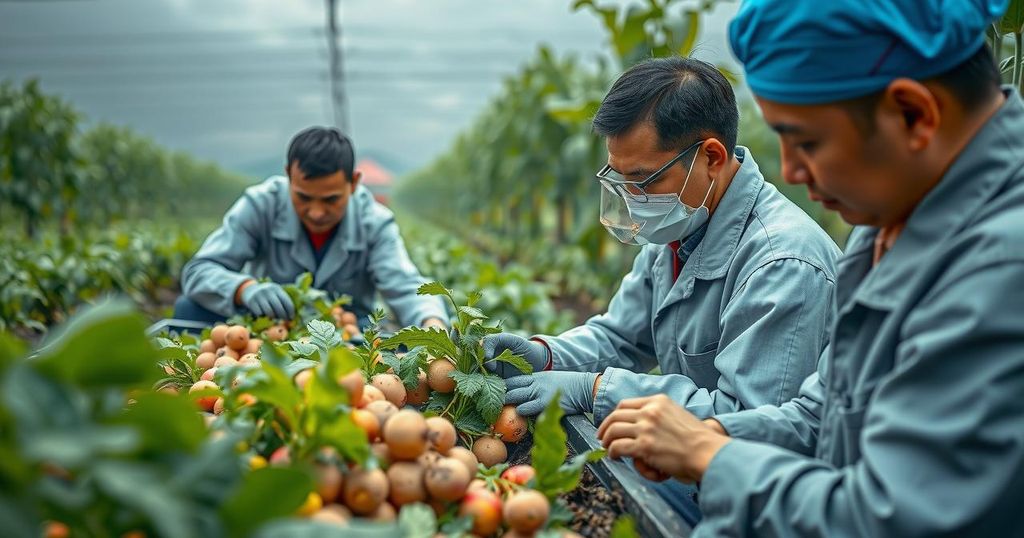Chinese scientists are conducting urgent research to develop climate-resistant potato varieties in response to rising global temperatures, which threaten food security by reducing potato yields. Led by Li Jieping from the International Potato Center, their study discovered that while increased temperatures expedite growth, they significantly decrease yields, necessitating adaptive strategies for Chinese farmers.
In a laboratory located northwest of Beijing, Chinese scientists, led by molecular biologist Li Jieping, are striving to climate-proof potatoes, a crop vital for global food security yet increasingly threatened by climate change. In their research, they harvested diminutive potatoes, some measuring the size of a quail’s egg, cultivated under conditions simulating predicted rising temperatures by the end of the century. Weighing only 136 grams, these tubers illustrate the potential adverse effects on food security, as they are significantly smaller than the typical potatoes produced in China, where larger varieties are preferred.
China stands as the world’s largest potato-producing nation due to their high yield compared to other staple crops. However, these crops are exceptionally sensitive to heat, as climate change elevates temperatures and exacerbates droughts and flooding. There is an urgent necessity to bolster food supplies, prompting Li’s research team at the International Potato Center (CIP) to investigate the impacts of rising temperatures on the two most prevalent potato varieties in China.
The team’s findings, recently published in “Climate Smart Agriculture,” revealed that while elevated temperatures hasten tuber maturation by ten days, they also result in yield reductions exceeding fifty percent. According to a United Nations report, without effective climate policies, global temperatures may increase by up to 3.1 degrees Celsius by the year 2100. This alarming prospect is already resonating with farmers in China, who are experiencing extreme weather conditions and seeking potato varieties that yield more and are less prone to diseases like late blight, which thrived during the Irish Potato Famine.
CIP’s research is part of a broader cooperative endeavor with the Chinese government aimed at supporting farmers in adapting to the anticipated warmer and wetter climates. Outside of Li’s lab, efforts are underway to develop heat-resistant potato varieties through the pollination of white potato flowers. Li emphasizes the urgency for Chinese farmers, advising that they adapt their planting schedules to springtime and consider higher altitudes to mitigate heat exposure in the coming decade.
The discussion surrounding climate change and its impact on agriculture has become increasingly pertinent, especially regarding staple crops such as potatoes. As a major food source worldwide, potatoes are essential for ensuring global food security. However, they face significant threats from rising temperatures, which can lead to accelerated growth but ultimately reduced yield. The need for adaptation strategies is critical, particularly in large producing nations like China, where climate change poses direct risks to agricultural productivity and food availability.
In conclusion, the research conducted by Chinese scientists highlights the pressing challenge of climate change on potato production. With findings indicating that higher temperatures may enhance growth rates while drastically reducing yields, actionable strategies must be implemented to safeguard food security. Collaborations between research organizations and governments are vital to develop heat-tolerant potato varieties, and farmers must adapt their practices to mitigate the impacts of extreme weather conditions in the future.
Original Source: www.aljazeera.com







